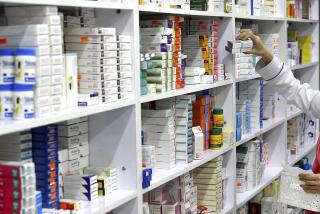Russia to Speed Acceptance of U.S. Drugs : Medicine: Moscow will rely heavily on FDA approval of American pharmaceuticals. The pact is a likely boon to health in the ex-Soviet republic.
- Share via
WASHINGTON — Embracing U.S. scientific standards, Russia has decided to allow near-automatic importation of hundreds of thousands of prescription and over-the-counter drugs made by American companies, the Clinton Administration announced Wednesday.
The decision should significantly enhance public health in a country whose quality of health care has deteriorated in recent years along with its overall economy, officials said. It also could boost long-term profits for U.S. pharmaceutical companies, they said.
“We’re not talking just about new, breakthrough drugs but penicillin, vaccines, insulin, drugs for hypertension, for polio, for diphtheria. This permits them to get even the basic, old-line workhorses,” said Mary K. Pendergast, a lawyer and deputy Food and Drug Administration commissioner who negotiated the memorandum of understanding between the two countries.
In the agreement, completed this week, the Russian Ministry of Health and Medical Industry said that it will eliminate virtually all barriers to the importation of drugs and biological products that have been approved by the FDA.
Russia imports about $350 million worth of drugs annually--more than 70% of what it needs. But U.S. pharmaceutical firms account for only $7 million of that total, according to FDA Commissioner David A. Kessler.
He said that the agreement means “potentially very large” financial gains for American drug-makers. The United States does not import drugs from Russia.
As a part of the agreement, the Russian ministry will no longer require U.S. firms to conduct clinical trials in Russia of drugs approved for use in the United States.
The ministry also will limit its review of such drugs to a 90-day period. Until now, there was no limit to the review period and U.S. manufacturers often were required to prepare voluminous scientific data--in Russian.
“This is the best kind of international cooperation,” said Donna Shalala, secretary of health and human services. “It can quickly bring some of the world’s safest and most effective drugs to millions to relieve their suffering and improve the quality of their lives.”
Kessler added, “This is a significant endorsement of the high standards of safety and efficacy set by the FDA and the quality of medicines produced by U.S. pharmaceutical companies.”
Neither country has entered into such an agreement before, FDA officials said.
The three-year, renewable pact calls for “prompt exchange of information on removal of drugs and biological products from the market or restrictions on their use.”
Drug industry officials hailed the development. “This milestone agreement will help greatly in improving access by Russian consumers to new drugs,” said the Pharmaceutical Manufacturers Assn. “It will streamline the drug approval process and should help ease the drug shortage in that country.”
“It’s great news,” added Tony Fiskett, a spokesman for Merck & Co. “But whether, and when, that translates into a more viable presence in the marketplace remains to be seen--because of Russia’s economy, the political system, their ability to pay for and distribute these products.”
More to Read
Sign up for Essential California
The most important California stories and recommendations in your inbox every morning.
You may occasionally receive promotional content from the Los Angeles Times.













